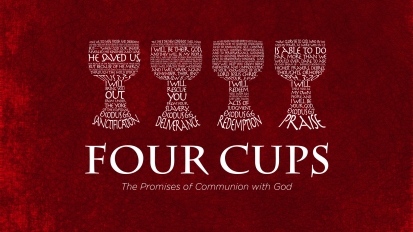 A few of years ago, I revised our family Haggadah with a special emphasis on revealing the Messiah. While I prefer a more traditional Haggadah and feel it amply reveals Messiah, it’s not about me. (Imagine that, lol!) My mother suggested this format for those new to keeping the Moedim (feasts). And, I completely agree with her. If we truly want to “love our neighbor,” we must consider where others are at on the journey. How we handle these “little children” is a direct reflection of our own hearts. After all, the Haggadah (the telling) opens with the words: “Let all who are hungry come and eat.”
A few of years ago, I revised our family Haggadah with a special emphasis on revealing the Messiah. While I prefer a more traditional Haggadah and feel it amply reveals Messiah, it’s not about me. (Imagine that, lol!) My mother suggested this format for those new to keeping the Moedim (feasts). And, I completely agree with her. If we truly want to “love our neighbor,” we must consider where others are at on the journey. How we handle these “little children” is a direct reflection of our own hearts. After all, the Haggadah (the telling) opens with the words: “Let all who are hungry come and eat.”
Yet, I’ve met some Torah keepers that refuse to allow certain people to “eat of their Passover.”[1] While I understand Torah commandments regarding this vital festival, I wonder if we are using just weights and equal measures when we make a judgment that refuses their participation? Will we deny the little children to entrance to the Kingdom? Do we have the “authority” to deny them?
Mat. 18:1-6 At that time the disciples came to Jesus and said, “Who then is greatest in the kingdom of heaven?” (2) And He called a child to Himself and set him before them, (3) and said, “Truly I say to you, unless you are converted and become like children, you will not enter the kingdom of heaven. (4) “Whoever then humbles himself as this child, he is the greatest in the kingdom of heaven. (5) “And whoever receives one such child in My name receives Me; (6) but whoever causes one of these little ones who believe in Me to stumble, it would be better for him to have a heavy millstone hung around his neck, and to be drowned in the depth of the sea.
Many “seasoned” in keeping the festivals have forgotten their first love and that that love “covers a multitude of sins.”[2] Misplaced zeal can easily morph into self righteousness and hard heartedness, which IS a great stumbling block to those coming to the knowledge of the truth. This haughty spirit believes it and its form of godliness and obedience has made it greater in the Kingdom. It boasts of its right calendar or right tradition. No one is immune to this spirit or how it affects and infects the Body. The irony is that it is the opposite of the Spirit of Passover. It is antithetical to the four cups and the matzah, because Passover is all about innocent faith, trust, and humility.
This year, Adonai has been speaking this message to me through the four traditional cups of the Passover Seder.[3] I had not previously meditated on the fact that the Passover meal centers around FOUR.[4] The number four in Hebrew is the letter “dalet.” It is a picture of a door (delet). Passover is YHWH’s appointed time or moed that commemorates the Israelites applying the blood of a lamb to the lintels and doorposts of their homes. Without this act of obedience through faith, the death angel would have smitten Israel’s firstborn sons along with the Egyptians during the tenth plague. Moreover, Yeshua declared Himself the door. Consider the context of the following verses. Those familiar with Pesach will receive His intent immediately.
“I am the door; if anyone enters through Me, he will be saved, and will go in and out and find pasture. The thief comes only to steal and kill and destroy; I came that they may have life, and have it abundantly.” (John 10:9-10)
All those in covenant with YHWH must, by faith, apply the Lamb’s blood to their doorposts (hearts). There has always only been one Way to the Father. Passover is the entry or doorway to covenant with Adonai.[5] Outside the covenant (door), the enemy seeks one’s destruction. This is illustrated through Cain[6] (sin crouches at the door) and with the death angel in Egypt passing over the homes with the blood of the Lamb.
Pesach is that first inkling of raw wisdom (light) that draws us unto the Father. It is realizing the depth of our depravity and our desperate need for a Savior. It is not as mature as Shavuot (Pentecost) or Sukkot (Tabernacles). But, it is still the entry point. It is accepting the Messiah and the Covenant. Understanding and deep Knowledge comes later and with maturity, as one journeys through the wilderness with YHWH. Again, will we deny the less mature babes from entering in?
When they had arrived and gathered the assembly together, they began to report all things that God had done with them and how He had opened a door of faith to the Gentiles. (Acts 14:27)
For I do not wish to see you now just in passing; for I hope to remain with you for some time, if the Lord permits. But I will remain in Ephesus until Pentecost; for a wide door for effective service has opened to me, and there are many adversaries. (1 Cor. 16:7-9)
There are real adversaries outside the “door.” The last thing one would desire to do is become an enemy to those trying to enter this DOOR! I’m afraid that some of us have (unintentionally) become an adversary to the immature children trying to enter. We must repent of this great tragedy! A wide door of effective service is open to us and the myriads that are loved by the Father. We have no right to be an enemy by standing in front of the door and blocking those that desire to “come.” Perhaps we do not yet properly understand righteous judgment. If we have received mercy, we should also extend mercy. (For more, consider reading: Hezekiah’s Passover.)
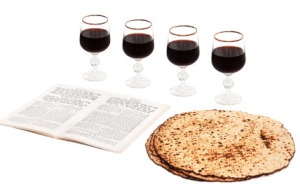 Four Cups
Four Cups
Ps. 116:12-13 (NASB) What shall I render to the LORD For all His benefits toward me? 13 I shall lift up the cup of salvation And call upon the name of the LORD.
Dr. Alewine’s Creation Gospel[7] model teaches that the number four has a lot in common with the number seven or fullness. It alludes to authority, government, and servanthood, first mentioned on day FOUR of creation. All these belong to Messiah Yeshua. He truly is the Door to Life. Passover may be the entry to the Covenant, but it points ahead to the complete redemption to come. The four cups of Passover mirror this truth in a profound way. They are based on the following passage from Exodus:
Ex. 6:6-7 “Say, therefore, to the sons of Israel, ‘I am the LORD, and I will bring you out from under the burdens of the Egyptians, and I will deliver you from their bondage. I will also redeem you with an outstretched arm and with great judgments. (7) ‘Then I will take you for My people, and I will be your God; and you shall know that I am the LORD your God, who brought you out from under the burdens of the Egyptians.
The four cups are called by different names depending on the Haggadah one is using. Don’t let this confuse you. It is very difficult to encapsulate the full meaning of each cup with one English word. Therefore, it is fitting that we embrace the various names used for each one and seek to understand how they harmonize or complete the “picture” of the promises given to us in Exodus.
- The Cup of Sanctification —- “I will bring you out”
- The Cup of Deliverance/Plagues/Judgment —- “I will deliver you”
- The Cup of Redemption/Blessing —- “I will redeem you”
- The Cup of Praise/Hope/Kingdom/Salvation/Restoration —- “I will take you for My people”
The cups are drunk in the following order throughout the seder:
- Drink 1st Cup with Kiddush (at the start of the seder).
- Drink 2nd Cup after the Maggid (telling of Pesach story).
- Drink 3rd Cup after Birkat Hamazon (blessing for the meal and Afikomen. Also, pour Elijah’s cup in anticipation for final redemption and coming Messiah.)
- Drink 4th Cup after Hallel (Psalms of praise).
We will look at each cup and explore its implications for the people of YHWH.
The Cup of Sanctification
“I will bring you out.” Ex. 6:6
Before saving faith, there is utter darkness. We are like dead men walking blindly toward our ultimate demise. In other words, one is in complete bondage to sin and death at this stage. There is no escape. Enter Adonai. Despite one’s circumstances and multiple transgressions, the Creator of Heaven and Earth loves His Creation. He loves YOU. Therefore, with a Mighty Hand, He separates us from the bondage of sin and death. One simply must believe His promise and apply the blood to the doorpost of their heart by faith. God alone separates His people from the clutches of “Pharaoh,” so they can freely serve Him.[8]
When enslaved to sin and death, one cannot serve or worship YHWH in the manner He prescribes. Logically, the first step is for Him to call or bring one out of this depravity. This is the symbolism of the first cup, sanctification. You have been set apart, called out, and marked as one of His children. Passover is the moed (feast) that demonstrates this reality in process, deed, and ritual.
How this is accomplished by the Father is also abundantly clear; it is by the blood of the Passover Lamb. This has been the process from the very beginning. (Rev. 13:8) Salvation has always been accomplished by believing (faith in action) in the promises of God.
By looking back on the original Passover, the first cup is akin to salvation from the harsh bondage of Egypt or Pharaoh (darkness/sin/death). Like the ancient Israelites, one might still be in a figurative Egypt or the world at this point, but the plagues of judgment placed on the evil taskmasters have lessened one’s hardships considerably. Light has pierced the darkness with a grand promise. We believe, watch, and wait for His deliverance.
The Cup of Deliverance
“I will deliver you.” Ex. 6:6
The second cup is based on YHWH’s promise to deliver you. How is this different from the first cup, “bringing you out?” Being called out and separated is only the beginning of the redemption process. Once separated unto the Father, one is still in great need of rescue. The trappings of Egypt are many. These bondages have many forms with very tight shackles. Like Pharaoh, they do not want to let us go! While some of these trappings are external, many are internal. One’s time in Egypt (the world) has created a lot of soul ties. One’s nephesh or flesh likes many of the delicacies in which it has grown accustomed. Hopefully, Abba will not have to send plagues or judgments in order for one to turn fully toward Him.
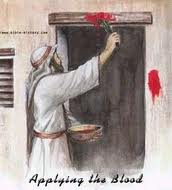 The good news is that no matter the issue, deliverance IS available. It’s never too late and one is never too old to experience this sweet release. When Israel was “delivered” from the burdens of the Egyptians, it was so that they could worship YHWH as He intended. Therefore, anything that hinders one from being able to worship Him in fullness can be likened to one of the “plagues,” whether they are external or internal. Anything that is placed before YHWH is an idol of the heart that needs to be removed. The point is to keep seeking for the Promise. Our Deliverer is Mighty!
The good news is that no matter the issue, deliverance IS available. It’s never too late and one is never too old to experience this sweet release. When Israel was “delivered” from the burdens of the Egyptians, it was so that they could worship YHWH as He intended. Therefore, anything that hinders one from being able to worship Him in fullness can be likened to one of the “plagues,” whether they are external or internal. Anything that is placed before YHWH is an idol of the heart that needs to be removed. The point is to keep seeking for the Promise. Our Deliverer is Mighty!
Traditionally, this cup is drunk at the conclusion of the maggid or retelling of the Passover story. Wine is a symbol of joy and celebration. Because our deliverance and liberation was costly to the lives the Egyptians, we decrease our joy in recognition of their suffering. Thus, one reduces their joy or the contents of the second cup by dipping a finger into their cup to remove a drop for each of the ten plagues or judgments.
This cup can be compared to being delivered and rescued from the clutches of Pharaoh. Though the enemy chased them with great haste and with many chariots, the mighty pillar of cloud by day and the pillar of fire by night would not allow the Egyptians to touch even one hair on the heads of the Israelites.
The Cup of Redemption
“I will redeem you.” Ex. 6:6
The third cup is often called redemption or blessing. YHWH buys back or redeems His people from the realm of sin and death. At the first Passover, the blood of the Lamb saved the lives of the Israelites. But with Pharaoh and Egypt closing in, many were sure that YHWH brought them into the desert to die. If we are honest, sometimes we feel the same way. Are you still there, Abba? Things are looking pretty bad down here! I am about to be swallowed up by the enemy! At this point, Israel would be standing in front of the Reed (Red) Sea. People that have known nothing but bondage often believe the worst in hard circumstances. It takes intent and time to change one’s attitude from victim to victor. Consider Israel’s words as they stood near the Reed Sea:
Ex. 14:11=12 Then they said to Moses, “Is it because there were no graves in Egypt that you have taken us away to die in the wilderness? Why have you dealt with us in this way, bringing us out of Egypt? “Is this not the word that we spoke to you in Egypt, saying, ‘Leave us alone that we may serve the Egyptians’? For it would have been better for us to serve the Egyptians than to die in the wilderness.”
To the Israelite’s natural eyes, their circumstances appeared to be hopeless. Even though they experienced the miracle of the plagues and the pillar of cloud and fire, they still weren’t convinced that God would actually save them. In fact, it probably felt as if He led them into a horrible trap (G-d Forbid)! But that was far from the true intent of our loving Elohim. Instead, He wanted the people (and us) to be completely confident in His saving power and in His great affection toward them. The very next verse says:
 Ex. 14:13-14 But Moses said to the people, “Do not fear! Stand by and see the salvation of the LORD which He will accomplish for you today; for the Egyptians whom you have seen today, you will never see them again forever. “The LORD will fight for you while you keep silent.“
Ex. 14:13-14 But Moses said to the people, “Do not fear! Stand by and see the salvation of the LORD which He will accomplish for you today; for the Egyptians whom you have seen today, you will never see them again forever. “The LORD will fight for you while you keep silent.“
Moses tells the people to stand still and see the salvation; that is, the YESHUA, of YHWH. Abba’s salvation, His Yeshua, will accomplish our complete redemption from Egypt (sin and death). YHWH will fight for us, while we shut our doubting mouths. This cup is drunk after the meal in the traditional seder. It is this cup that Yeshua linked to the New Covenant and His shed blood:
And in the same way He took the cup after they had eaten, saying, “This cup which is poured out for you is the new covenant in My blood. (Luke 22:20 NASB)
The cup of blessing that we bless, is it not a partaking of the blood of Messiah? The bread which we break, is it not a partaking of the body of Messiah? (1 Cor. 10:16 HRB)
This cup also mirrors the timing of the parting sea, and crossing over on dry ground. Doubting the intentions of Elohim is no longer an option; redemption or being bought back by the Almighty is a clear and present reality. The waters figuratively wash the deathly dust of Egypt from weary souls and baptize one in Moses and Yeshua. Thus, hearts are prepared for the upcoming fourth cup of hallel or praise.
Rev. 15:2-4 And I saw something like a sea of glass mixed with fire, and those who had been victorious over the beast and his image and the number of his name, standing on the sea of glass, holding harps of God. And they sang the song of Moses, the bond-servant of God, and the song of the Lamb, saying, “Great and marvelous are Your works, O Lord God, the Almighty; Righteous and true are Your ways, King of the nations! “Who will not fear, O Lord, and glorify Your name? For You alone are holy; For ALL THE NATIONS WILL COME AND WORSHIP BEFORE YOU, FOR YOUR RIGHTEOUS ACTS HAVE BEEN REVEALED.”
Messiah said that He wouldn’t partake of this cup again until, “I drink it new with you in My Father’s kingdom.” (Mt. 26:29)
Mar. 14:23-26 And when He had taken a cup and given thanks, He gave it to them, and they all drank from it. (24) And He said to them, “This is My blood of the covenant, which is poured out for many. (25) “Truly I say to you, I will never again drink of the fruit of the vine until that day when I drink it new in the kingdom of God.” (26) After singing a hymn, they went out to the Mount of Olives.
Interestingly, and a wonder to meditate upon, the Mishnah has an interesting note about not drinking additional wine between the third and four cups.
They mix a third cup; he blesses his meal. [The] fourth [cup] is concluded with Hallel, which he says with the [concluding] blessing. Between these cups, if he wishes to drink, he may drink. Between the third and the fourth [cups], he may not drink. – Pesachim 10:7
Passover is about REDEMPTION. Yeshua is our Sanctifier, our Deliverer, and our Redeemer. Of all the Biblical stories about exile and redemption, Passover is the one that YHWH asks one to personally identify with. Passover is Personal; it is the cup of our salvations, as Psalm 116:13 declares. The many sets of “fours” associated with Passover, like the cups, are wonderful tools to help one accurately recount this most important truth.
The Cup of Praise
“I will take you for My people.” Ex. 6:7
The fourth and final cup is a picture of restoration and completeness. This is one reason it is sometimes called the cup of hope, acceptance, or salvation. I prefer its more common name, hallel or praise. Though the Passover is the beginning of YHWH’s moedim (feasts) cycle, in it, He declares the end.[9] God’s desire has always been to restore us (deal with our sin) and then dwell with us for eternity.
Thus, with the fourth cup, we await the coming Kingdom of Heaven where Yeshua will be our King. Wine can be a symbol of judgment or blessing.[10] A cup or kos can denote the same imagery. Passover weaves both of these themes together seamlessly. Sin and wickedness must be judged. There is a false bread and a false wine that competes with Adonai’s covenant Passover meal. Like the righteous woman and the harlot, both call and ask one to rest in their presence.
Pr. 4:17 For they eat the bread of wickedness And drink the wine of violence.
Obviously, the harlot feeds one false bread and wine; which is, in reality a covenant of wickedness. The problem is that the nephesh or flesh craves the (spiritual) false bread and wine just as one often prefers processed junk rather than the healthy plants and animals that Abba meant for consumption.
Nephesh (flesh) fears judgment because it knows that what it likes isn’t healthy or holy. Like the Israelites, we often fear that YHWH won’t keep His promise to bring us out, deliver us, redeem us, and make us His people. Many feel as though they will get lost in the shuffle of the four cups. But YHWH is faithful, even when we are not![11]
1 Th. 5:23-24 Now may the God of peace Himself sanctify you entirely; and may your spirit and soul and body be preserved complete, without blame at the coming of our Lord Jesus Christ. Faithful is He who calls you, and He also will bring it to pass.
Though Passover is certainly the season to thoroughly examine oneself and root out all chametz (sin), it is also a time to remember these four grand promises of Adonai. His Word will not return to Him void. I think many fear that instead of blessing, Adonai will only rain down judgment upon their head. For we know that we are not worthy. And, we know that there is a lot that we still don’t know.
Is. 55:11-12 So shall My word be that goes forth from My mouth; It shall not return to Me void, But it shall accomplish what I please, And it shall prosper in the thing for which I sent it. “For you shall go out with joy, And be led out with peace; The mountains and the hills Shall break forth into singing before you, And all the trees of the field shall clap their hands.
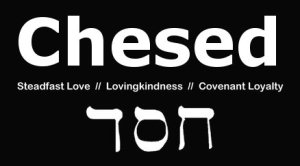 Psalm 136 is generally recited or sang before partaking of the fourth cup. This Psalm recounts the fact that Adonai’s mercy/lovingkindness/grace endures forever. This is good news! The Hebrew word repeated over and over in this Psalm is chesed (חֶסֶד). Abba’s chesed endures forever. Chesed cannot be encapsulated by just one English word. In fact, it would take a book or many volumes to fully realize the depth of what chesed actually means.
Psalm 136 is generally recited or sang before partaking of the fourth cup. This Psalm recounts the fact that Adonai’s mercy/lovingkindness/grace endures forever. This is good news! The Hebrew word repeated over and over in this Psalm is chesed (חֶסֶד). Abba’s chesed endures forever. Chesed cannot be encapsulated by just one English word. In fact, it would take a book or many volumes to fully realize the depth of what chesed actually means.
To put it as succinctly as possible, chesed is a covenantal term that encompasses both love and loyalty. God has chesed toward us and hopefully, we have chesed toward Him and our neighbor. My acceptance of His chesed requires that I give it back to Him and to others. The Theological Workbook of the Old Testament says this under chesed:
“God’s loving-kindness is that sure love which will not let Israel go. Not all Israel’s persistent waywardness could ever destroy it. Though Israel be faithless, yet God remains faithful still. This steady, persistent refusal of God to wash his hands of wayward Israel is the essential meaning of the Hebrew word which is translated loving-kindness.”
The wonderment of God’s immense chesed toward us may cause one to question His righteous judgment or justice. How do mercy and judgment coexist? Which one is stronger? Obviously, we do not deserve the chesed or loving-kindness of God. The Bible is full of examples of a wayward stiff-necked Israel. We are no different. Like them, we most often refuse to walk in His Ways. In other words, we all deserve judgment, destruction, and death.
Knowing this, most have an unhealthy fear of the coming worldwide judgment, life circumstances in general, and of what God is going to do with our “loved” ones. But, this type of thinking is fear based. It is not rooted in chesed or true love. All of one’s worries, anxieties, and fears come forth from a skewed view of the Creator. He is no tyrant, dictator, or sadist. He is LOVE.
1Jn. 4:16-19 We have come to know and have believed the love which God has for us. God is love, and the one who abides in love abides in God, and God abides in him. By this, love is perfected with us, so that we may have confidence in the Day of Judgment; because as He is, so also are we in this world. (18) There is no fear in love; but perfect love casts out fear, because fear involves punishment, and the one who fears is not perfected in love. We love, because He first loved us.
Notice what John says above. FEAR has to do with punishment. When we only fear punishment, our love is NOT perfected. In other words, if we fail to grasp how deep and wide the love that God has for us really is, we will fear. We will worry. We will believe that YHWH is ready to strike us down at our very next breath. But LOVE, that is His chesed, is stronger than the judgment we all deserve. John reminds us of this, so that we can have confidence in the Day of Judgment.
YHWH is certainly a holy and righteous Elohim, but His love for His people is greater still. Rashi said that God gave “precedence to the rule of mercy” and joined it “with the rule of justice.” God’s judgment and His mercy is an enigma to our peon minds and hearts. Which shall we receive? Passover is the perfect time to ponder this question. The cups reveal the answer. Within each, wickedness is judged and yet mercy prevails. The paradox may twist one’s brain, but hopefully it causes your heart to rejoice.
Adonai will NEVER give up on you, me, our loved ones, or any one else. His chesed is incomprehensible. His love NEVER fails, it NEVER gives up, and NEVER runs out on you or me. This is chesed. This is Love. This is Covenant. This is Passover. May your Cup of Praise runneth over this Pesach and always.
For more on Pesach, click here.
[1] They are referring to those still in the “church” or those that may not be as “Torah observant” as themselves. There are direct and clear commandments that admonish us to not eat (the Passover) with those that are practicing blatant and willful sin. However, we must remember that there is always a sacrifice for sin committed in ignorance. If YHWH provides a sacrifice for them, we should also. Those that DO know better and yet persist in their sin, Paul has the correct course of action to take: But now I have written unto you not to keep company, if any man that is called a brother be a fornicator, or covetous, or an idolater, or a railer, or a drunkard, or an extortioner; with such an one no not to eat. (1Cor. 5:11 KJV)
[2] 1 Peter 4:8
[3] Please refer to Dr. Hollisa Alewine’s Creation Gospel workbooks. These thematic studies will forever change your worldview of the Scriptures. Your understanding of the “bigger picture” will come into sharp focus by learning about the Seven Spirits of God and how they operate in both the physical and spiritual realms. Thecreationgospel.com
[4] For example, there are FOUR sons (or children) that ask FOUR questions, three matzot (unleavened bread) become FOUR with the breaking of the middle cracker, YHWH uses FOUR expressions to describe our redemption from Egypt, which is mirrored in the FOUR cups of wine.
[5] Whether they realize it or not, when a Christian accepts Yeshua as their Lord and Savior and repents of their sins, they are in effect applying the Passover Lamb’s blood to their “doorposts.”
[6] “If you do well, will not your countenance be lifted up? And if you do not do well, sin is crouching at the door; and its desire is for you, but you must master it.” (Gen. 4:7)
[7] Thecreationgospel.com
[8] The famous “Let my people go” phrase is always followed by YHWH’s intent: “so that they might serve me.” Ex. 7:16; 8:1,20; 9:1, 13; etc.
[9] Is. 46:9-10 “Remember the former things long past, For I am God, and there is no other; I am God, and there is no one like Me, Declaring the end from the beginning, And from ancient times things which have not been done, Saying, ‘My purpose will be established, And I will accomplish all My good pleasure‘.
[10] Ps. 75:7-8 But God is the Judge; He puts down one and exalts another. For a cup is in the hand of the LORD, and the wine foams; It is well mixed, and He pours out of this; Surely all the wicked of the earth must drain and drink down its dregs.
Pr. 3:9-10 Honor the LORD from your wealth And from the first of all your produce; So your barns will be filled with plenty And your vats will overflow with new wine.
[11] 2 Tim. 2:11-13 It is a trustworthy statement: For if we died with Him, we will also live with Him; If we endure, we will also reign with Him; If we deny Him, He also will deny us; If we are faithless, He remains faithful, for He cannot deny Himself.
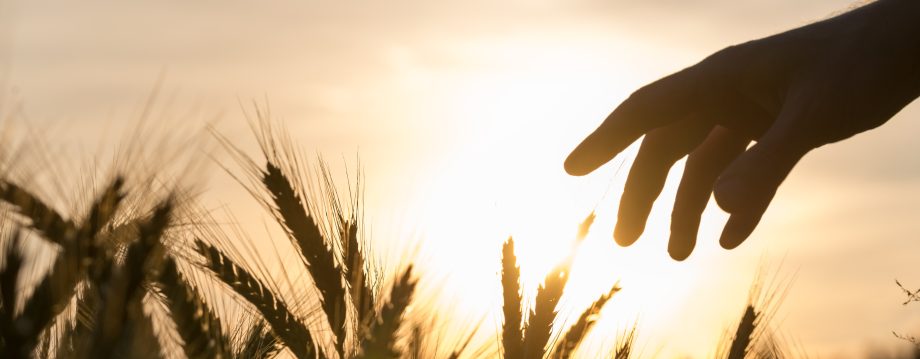




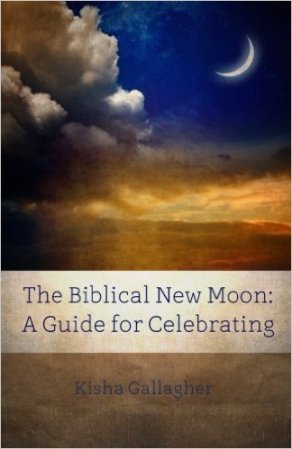
Awesome post. I will have new insight when I am partaking of the cups this Passover. Love you Mom
LikeLiked by 1 person
Just what I needed to read right now! Thanks
LikeLiked by 1 person
I love how you start this teaching. This year will be the 3rd year i open the doors of Bet Tehillah to the community i serve. How much more their love for the FATHER will grow when they see how HE delivers HIS own and redeems them. You have truely circumcised your heart as our FATHER desires. I look forward to meeting you one day in glory.
LikeLiked by 1 person
Elindah,
I pray that Abba opens eyes at your Seder this year! It’s refreshing to know that you are opening the DOOR to all the (spiritual) babes. 🙂 And I agree, we shall meet one day in glory! Be blessed, my friend!
K
LikeLike
Just so blessed,so refreshed going through this.
LikeLiked by 1 person
Thank you so much for your kind words, James. You bless me with your encouragement. May your Pesach be richly filled with shalom, wisdom, and praise!
K
LikeLike
Thank you K, for this great post! I enjoyed reading it and receiving your insights about the 4 cups of Passover. I especially liked your instructions about the Hebrew word ‘chesed.’ I needed to be reminded that God’s love includes loyalty! and also, that Father refuses to give up on me! HalleluYAH!
LikeLiked by 1 person
Thanks Deborah!
LikeLike
I would like to print this. How?
LikeLiked by 1 person
Look at the bottom of the post past the footnotes. You should see an area where you can share on social media or print. If you hit the print button, it simply puts the post in a format better for printing. If you continue to have trouble, email me at gracentorah@gmail.com and I’ll send you the post in pdf format to print. 😊
LikeLike
I would be interested in purchasing the image The Four Cups of Passover. Is this available?
Thank you
LikeLike
Kim,
Sorry, but I do not own that image. I hope you have a blessed Pesach!
K
LikeLike
It seems to be my way to come LATE to His table! The replies above are from 2 years ago and I just now found your message by an internet search on “the four cups of wine in the Seder”. Thank you for clarifying the thing I was perplexed about (namely, HOW do we know that Our Lord used the THIRD Passover cup for his New Covenant statement?) BUT ALSO for showing me how ALL 4 cups contain the glorious paradox of The Father’s judgement/mercy. You have fed my spirit today as I am being shown a number of most personal things by Jesus concerning his refusal of the 4th cup (joyful anticipation of Wedding Feast to come!)
LikeLiked by 1 person
You are never too late for His table! (: May Adonai continue to bless you as you seek Him. I look forward to seeing you at the Wedding Feast!
LikeLike
Thank you for details
LikeLike
Pingback: Rosh Chodesh Nisan 5779 (2019) | GRACE in TORAH
Pingback: The Bread of Affliction | GRACE in TORAH
Thank you so much for this! It is very timely for the days we are walking in!
LikeLiked by 1 person
Pingback: Our Faithful Lord: Passover to Easter | The Interpreter Foundation